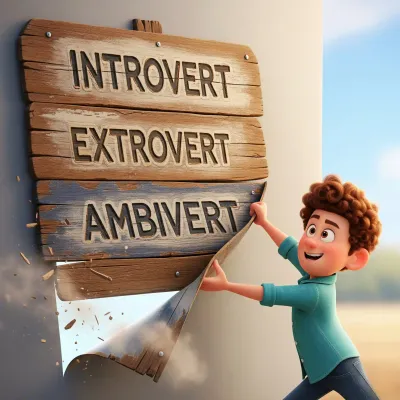Anxiety in disguise: The feelings you didn't know were signals
We've been sold this Hollywood version of anxiety where people hyperventilate into paper bags and have dramatic meltdowns. But real anxiety? It's way more sneaky than that.

Anxiety in disguise: The feelings you didn’t know were signals
Here’s the thing nobody tells you about anxiety: it doesn’t always come knocking on your front door with a neon sign and a panic attack. More often than not, it slips in through the back window, disguised as a hundred other things you’ve convinced yourself are just “normal.” It’s that chest tightness when your phone buzzes. The fact that you haven’t had a decent night’s sleep in months but keep telling everyone you’re just “a light sleeper.” The way you need seventeen different tasks going at once because sitting still feels like drowning. Sound familiar? You’re not alone—and you’re definitely not imagining it.
The anxiety that doesn’t look like anxiety
We’ve been sold this Hollywood version of anxiety where people hyperventilate into paper bags and have dramatic meltdowns. But real anxiety? It’s way more sneaky than that. It shows up as irritability when your coworker chews too loudly. It’s the perfectionism that has you rewriting emails six times. It’s chronic exhaustion that no amount of coffee can touch, digestive issues your doctor can’t explain, and that constant background noise in your head telling you to do more, be more, achieve more. The trickiest part? Anxiety is a master of disguise. It’ll wear the mask of ambition, productivity, even success. You might be the person everyone admires for “having it all together” while internally running on fumes and caffeine prayers. Your anxiety doesn’t scream—it whispers things like “just stressed,” “just busy,” or “just how I am.”
When your lifestyle is actually your anxiety talking
Alfred Adler, the brilliant psychologist who understood humans way before we had fancy brain scans, had this concept called “lifestyle”—basically, your unique blueprint for how you navigate life. Your beliefs, your coping strategies, your deepest goals all rolled into one personalized survival guide. Here’s where it gets interesting: sometimes what we call our “lifestyle” is actually anxiety wearing a really convincing costume. That relentless drive for significance Adler talked about? Sometimes it’s not ambition—it’s fear dressed up in a business suit. The need to control every detail, to be indispensable at work, to never say no to anything—these aren’t character traits. They’re anxiety’s way of trying to keep you safe from some imaginary disaster your nervous system is convinced is coming.
Here’s the kicker: In Adlerian psychology, symptoms aren’t random glitches. They’re your psyche’s way of achieving something, even if that something is keeping you stuck in patterns that don’t actually serve you.
The Great Misunderstanding Championship
Let’s play a game I call “Anxiety or Just Life?” Ready? “I’m just a perfectionist”—nope, that’s fear of failure running the show. “I hate small talk”—actually, that’s social anxiety wearing an introvert costume. “I’m tired all the time”—emotional exhaustion masquerading as needing more vitamins. “I need to stay busy”—avoidance of whatever uncomfortable truth is waiting in the quiet moments. Look, I get it. It’s way easier to say “I’m just driven” than to admit you’re terrified of not being enough. It’s simpler to claim you’re “naturally high-energy” than to acknowledge you can’t sit with your own thoughts for five minutes without wanting to crawl out of your skin. But here’s the thing about misunderstanding your own anxiety—it keeps you trapped in patterns that exhaust you while pretending they’re just “who you are.”
Tuning into what your body’s been trying to tell you
Recognizing hidden anxiety isn’t about becoming a walking diagnosis machine. It’s about getting curious instead of getting defensive. Adler was big on this: look at the purpose behind the behaviour. What is all this busyness, this perfectionism, this need to control actually trying to accomplish for you? Start asking yourself different questions. Instead of “Why am I so tired?” try “What am I trying to avoid by staying this busy?” Instead of judging that pit in your stomach when you have nothing to do, get curious: “What comes up when I stop moving?” Simple body awareness can be revolutionary here. Take five deep breaths and actually notice where you hold tension. Pay attention to how your chest feels when your phone buzzes, or what happens in your shoulders when someone asks you to slow down. The goal isn’t to become a perfect anxiety detective overnight. It’s to start treating these signals like information instead of character flaws.
From Unaware to Unburdened
Here’s what Adler knew that most of us forget: you have way more power over your patterns than you think. Once you start seeing anxiety for what it really is—not a personality trait, not “just how you are,” but a signal system that’s been working overtime—you can start making different choices. The beautiful thing about recognition is that it’s the first step toward freedom. When you stop calling your anxiety “ambition” or “just being responsible,” you can actually address what’s driving it. You can start asking better questions, setting actual boundaries, and maybe—just maybe—giving your nervous system a break from being on high alert 24/7.
So here’s my question for you: What part of your life feels heavier than it should? What pattern do you keep explaining away as “just who I am”? Because there’s a pretty good chance that weight you’re carrying isn’t character—it’s anxiety asking for some attention, some compassion, and maybe a different way forward. Your anxiety doesn’t always scream. Sometimes it whispers. But once you learn its language, you can finally start having a real conversation about what you actually need.
Ready to dive deeper into understanding your own patterns? Try the Anxiety Assessment Tool on our website to uncover the hidden signals your mind and body might be sending you.
Related Posts

Emotional Eating: Why healing isn’t in your fridge
Let's be real—sometimes the fridge is a therapist. Crappy day? Chocolate. Lonely night? But the truth is that healing isn't residing in your fridge, and emotional eating isn't about food—it's about feelings.

Introvert, Extrovert, Ambivert — Labels that may be limiting your mental growth
Here's the catch, all labels feel like a shortcut to knowing yourself, but sometimes they're the quickest path to self-imposed limitation.

Unlearning your childhood self: Forward psychology in practice
Learn how to unlearn all those toxic beliefs you picked up in childhood and build a better you
